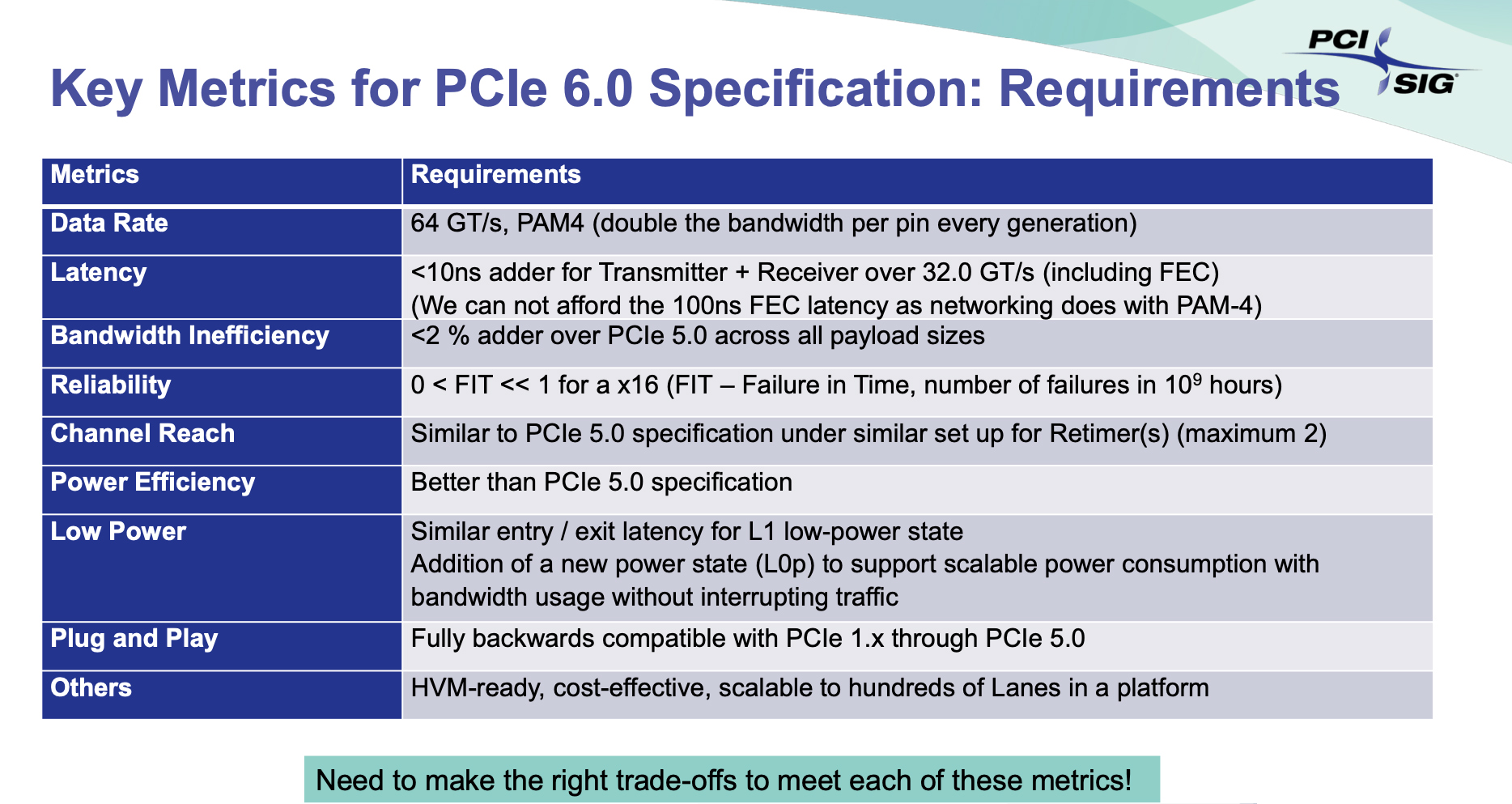PCIe 6.0 moves closer to arriving in the market in 2024: Alphawave demonstrates interoperability
Alphawave's PCIe 6.0 IP with CXL 2.0 support is ready.

Alphawave, a silicon IP provider and a contract chip designer, this month teamed up with Keysight, a testing and verification equipment maker, to demonstrate interoperability of its PCIe 6.0 controller and physical interface with Keysight's testing equipment at a data transfer rate of 64 GT/s. The move verifies that Alphawave is ready to build chips with a PCIe 6.0 interface, joining a growing roster of companies that are preparing the ecosystem for the arrival of the first commercially available PCIe 6.0 devices in 2024.
Synopsys, an IP provider, has been offering its PCIe 6.0 IP package containing a controller and physical interface (PHY) since 2021, and earlier this year, the company demonstrated interoperability of its PCIe Gen6 solution with Intel's test chip.
Alphawave's silicon implementation of a PCIe 6.0 64 GT/s interface not only works with Keysight's Protocol Exerciser at full speed with pulse amplitude modulation with four levels (PAM4) signaling, but it also supports the CXL 2.0 protocol, which is an industry's first. The implementation also fully supports PCIe Gen6's Forward Error Correction (FEC), FLIT mode, and other features of the new interconnection standard. Furthermore, this PCIe Gen6 platform can be further expanded with the CXL 3.0 protocol.
"Test and measurement are critical aspects to interoperability, enabling Alphawave Semi to bring our products and customer solutions to market faster," said Letizia Giuliano, Vice President of IP Product Marketing at Alphawave Semi. "We are excited about our collaboration with Keysight, which speeds up the transition to 64 GT/s through Keysight’s state-of-the-art PCIe 6.0 protocol validation solution and instills confidence in our ability to consistently provide connectivity solutions that accelerate AI processing in high-performance computing and data infrastructure."
Synopsys licenses its IP and technologies primarily to large chip designers. By contrast, Alphawave develops bespoke chips or license technologies for smaller companies that do not tend to design or implement IP themselves. The company claims its PCIe subsystem is extremely power-efficient, offers low latency, and 'has been built off the industry's most successful PAM4 SerDes IP.' Furthermore, this PCIe Gen6 platform can be further expanded with the CXL 3.0 protocol.
Get Tom's Hardware's best news and in-depth reviews, straight to your inbox.

Anton Shilov is a contributing writer at Tom’s Hardware. Over the past couple of decades, he has covered everything from CPUs and GPUs to supercomputers and from modern process technologies and latest fab tools to high-tech industry trends.
-
bit_user Don't look for PCIe 6.0 in mainstream PCs, any time in the near future. Supporting PCIe 6.0 will add cost to both devices and boards. Devices' PHYs will need to handle PAM4 and the additional protocol complexity, while boards will need better signal integrity, as PCIe 6.0 is slightly less noise-tolerant than PCIe 5.0. Considering that it's a stretch to justify having even PCIe 5.0 on consumer platforms, I don't see a case to be made for bringing 6.0 (at least, not before we transition over to CPUs with on-package DRAM and using CXL.mem for external expansion).Reply
I said this about PCIe 5.0, but I might actually be right this time!
😅 -
Avro Arrow I don't know WTH is going on here because PCIe5 is brand-new and still considered rather exotic. Like, you have to get an "E" version of an AM5 motherboard to have a PCIe5 x16 slot with non-E motherboards having PCIe4 so how is PCIe6 already even a thing???Reply
Colour me confused. :oops: -
bit_user Reply
Standards development usually runs a couple years ahead of full production deployment. In the meantime, test equipment makers need to add support for the new standard, so that new designs & products can be validated before they tape out and ship.Avro Arrow said:I don't know WTH is going on here because PCIe5 is brand-new and still considered rather exotic.
After there's a way to test it, the IP, itself, has to be designed & validated, which is apparently where we're now at with PCIe 6.0. There's still another step to go before the IP is integrated into products and those products are validated and launched.
The datacenter industry is hungry for more bandwidth. For AI, 800 Gbps networking... that sort of thing.Avro Arrow said:so how is PCIe6 already even a thing???
The PCIe 7.0 standard is already in the works. -
jeremyj_83 Reply
For home use and even most workstations PCIe 5 isn't needed at the time. However, it is VERY MUCH needed in the data centers. The use of physical SANs is slowly going away. For one Fibre Channel isn't keeping up with new storage speeds. The other reason is cloud providers are all going hyperconverged. Having 24x PCIe 5 SSDs is 3Tb of PCIe bandwidth that needs to be sent out to VMs. PCIe 5 allows for 4x 400Gb networking with the 24 SSDs. You can see where doubling that network bandwidth will be very nice.Avro Arrow said:I don't know WTH is going on here because PCIe5 is brand-new and still considered rather exotic. Like, you have to get an "E" version of an AM5 motherboard to have a PCIe5 x16 slot with non-E motherboards having PCIe4 so how is PCIe6 already even a thing???
Colour me confused. :oops: -
Avro Arrow Reply
I get that but that's not what's confusing me. PCIe5 only just came out, making PCIe4 the shortest-lived PCI-Express standard. Now it looks like PCIe5 will have an even shorter lifespan than even PCIe4.jeremyj_83 said:For home use and even most workstations PCIe 5 isn't needed at the time. However, it is VERY MUCH needed in the data centers. The use of physical SANs is slowly going away. For one Fibre Channel isn't keeping up with new storage speeds. The other reason is cloud providers are all going hyperconverged. Having 24x PCIe 5 SSDs is 3Tb of PCIe bandwidth that needs to be sent out to VMs. PCIe 5 allows for 4x 400Gb networking with the 24 SSDs. You can see where doubling that network bandwidth will be very nice. -
bit_user Reply
Eh, the current pace probably just seems abnormal because the industry stalled out on PCIe 3.0 for so long.Avro Arrow said:I get that but that's not what's confusing me. PCIe5 only just came out, making PCIe4 the shortest-lived PCI-Express standard.
Source: https://pcisig.com/blog/evolution-pci-express-specification-its-sixth-generation-third-decade-and-still-going-strong
IBM had POWER CPUs on the market that supported PCIe 4.0, back in 2018. AMD followed with support for it on Zen 2, in 2019. So, the 2021 introduction of products supporting PCIe 5.0 is pretty much on pace with the standard.
A big factor pushing PCIe 5.0, that shouldn't be underestimated, is CXL 1.0. It shares support for the same PHY as PCIe 5.0, and some server CPUs can reconfigure lanes to run in either mode. CXL is a big deal for servers and hyperscalers. I expect CXL 3.0 will also be one of the main drivers of PCIe 6.0 (again, the two share the same PHY specification).
Not on desktops. As I said, I think PCIe 6.0 will remain server-only, until more drastic changes arrive on the mainstream PC platform. Adding it now would just increase costs, while providing no practical benefits.Avro Arrow said:Now it looks like PCIe5 will have an even shorter lifespan than even PCIe4. -
DougMcC Disagree with those who think it won't come to the desktop. I think you're forgetting that 6>5, and marketing.Reply -
bit_user Reply
You're forgetting how much outrage there was over LGA 1700 and AM5 motherboard prices. I doubt Intel and AMD have, though.DougMcC said:Disagree with those who think it won't come to the desktop. I think you're forgetting that 6>5, and marketing. -
ThomasKinsley If PCIe6 helps with AI, then it might come to market soon. I could see a cut-down H100 with 24GB running on a PC.Reply -
bit_user Reply
They already released a PCIe version more than a year ago.ThomasKinsley said:I could see a cut-down H100 with 24GB running on a PC.
https://www.anandtech.com/show/17405/nvidia-to-release-liquid-cooled-a100-and-h100-pcie-accelerators
I think Nvidia doesn't really care about PCIe 6.0, since they mostly depend on their own NVLink for connectivity, when it counts.
